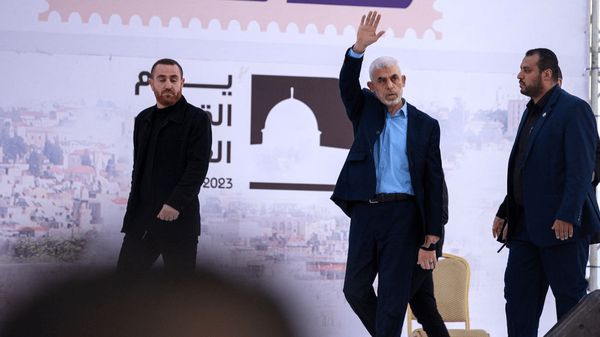The bold prediction of the martyred Hamas commander has become an undeniable reality today; Israel has sunk into global isolation, and the wave of recognition of the state of Palestine by governments indicates a change in regional equations.
According to the Ashura News Agency, quoted by Fars; The prediction of the martyred leader of the Hamas movement, Yahya Sinwar, about the isolation of the Zionist regime and the recognition of the state of Palestine, has now become a tangible reality and everyone is testifying to it, especially after the officials of the occupation regime and its allies, including US President Donald Trump, acknowledged the isolation of Israel and the recognition of the state of Palestine by many countries in the world. In an old video, Sinwar had said that he expected the Palestinian resistance to be able to exert effective international pressure on the Zionist regime within a year to force it to respect international laws and stop violating rights in the West Bank, or to achieve global recognition of the state of Palestine and place Israel in political isolation. Two years have passed since the genocidal war, and this period was enough for that prediction to come true, especially with the intensification of developments during the "Al-Aqsa Storm", which caused tangible changes at the popular and international levels in Palestine and Jerusalem.
Global Awakening Wave; Demonstrations in Support of Palestine. Arabi 21 published a note on this topic by Tariq Al-Sabai, citing posts from social media users: The effects of the fulfillment of Yahya Al-Sinwar's prophecy have been clearly visible on a popular and global level; major cities in Europe and the world witnessed widespread demonstrations in support of Gaza and the Palestinian people. In Paris, London, Berlin, Italy and the Netherlands, tens of thousands of people participated in solidarity marches and chanted slogans explicitly calling for an end to Israeli aggression and the lifting of the siege on Gaza. East Asians also stood by Palestine; the youth and media alliance in East Asian countries, including South Korea, Japan, Indonesia and Malaysia, also held large gatherings. The youth declared their solidarity with the Palestinian people with unified slogans. The growing public awareness of the humanitarian catastrophe in Palestine, aided by the media and social media that broadcast live images from the battlefield, has increased pressure on governments to take official positions of support. Countries are recognizing Palestine one by one. At the same time as this popular wave, several countries have announced that they recognize Palestine as an independent state, a move that is seen as a partial fulfillment of Sinwar's prediction. Among these countries are the United Kingdom, Canada, Australia, Portugal, France, Slovenia and Spain.
The right to self-determination; the focus of official statements by countriesIn their official statements, these countries emphasized the right of the Palestinian people to self-determination and announced that this recognition was made in order to support regional peace and stability. Some of these confessions were of a diplomatic symbolic nature, while others will have a direct impact on the process of future political negotiations between Palestine and Israel. A user named "Abdullah Al-Bandar" considered the raising of the Palestinian flag over the Palestinian embassy in London, with a large crowd, a symbol of diplomatic victory and global solidarity in cyberspace, describing it as a historic moment.
The author goes on to say that while recognition of the Palestinian state by some states carries great semantic and symbolic weight, its practical impact on the ground is limited. The main challenges include: - Israel's de facto control over the West Bank and Gaza, which makes many international recognitions purely symbolic. - The linkage of some recognitions to internal Palestinian conditions, such as political reform and national unity among different groups, which can limit real political momentum. - The reactions of Israel and its allies, which may include diplomatic or economic pressure on countries that have recognized Palestine. Political rapprochement with Israel; The determining factor in the type of recognition In an exclusive interview with Arabi21, Ahmed Farasini, a researcher on European affairs and president of the Palestine Club in Belgium, emphasized that the type of recognition countries give to Palestine varies depending on their political positions and the degree of proximity or dependence they have on the Israeli occupation regime. He added: Some governments have recognized Palestine based on specific international resolutions and have set borders such as the 1967 borders as a basis of reference. In contrast, others have offered conditional or partial recognitions that depend on political or security positions related to Israel. The result of these differences is a clear contradiction in the nature and seriousness of these recognitions.
Conditional Recognition; Challenges of Imposed Democracy Farasini also noted that some countries have set conditions for recognizing Palestine; Including internal reforms, disarmament of resistance groups, removal of provocative content from textbooks, and even holding elections in which groups opposed to official policies are eliminated. He emphasized that these types of conditions raise serious questions about the concept of "democracy" put forward by these countries, especially when they impose certain political criteria from outside the Palestinian context.


Post a comment